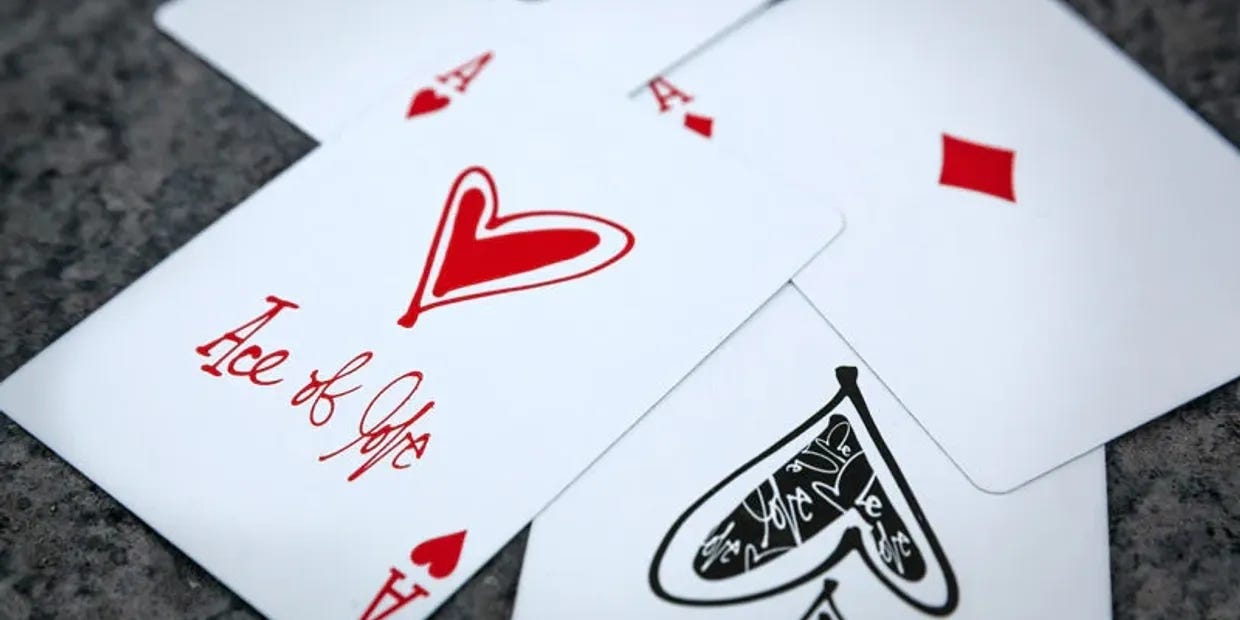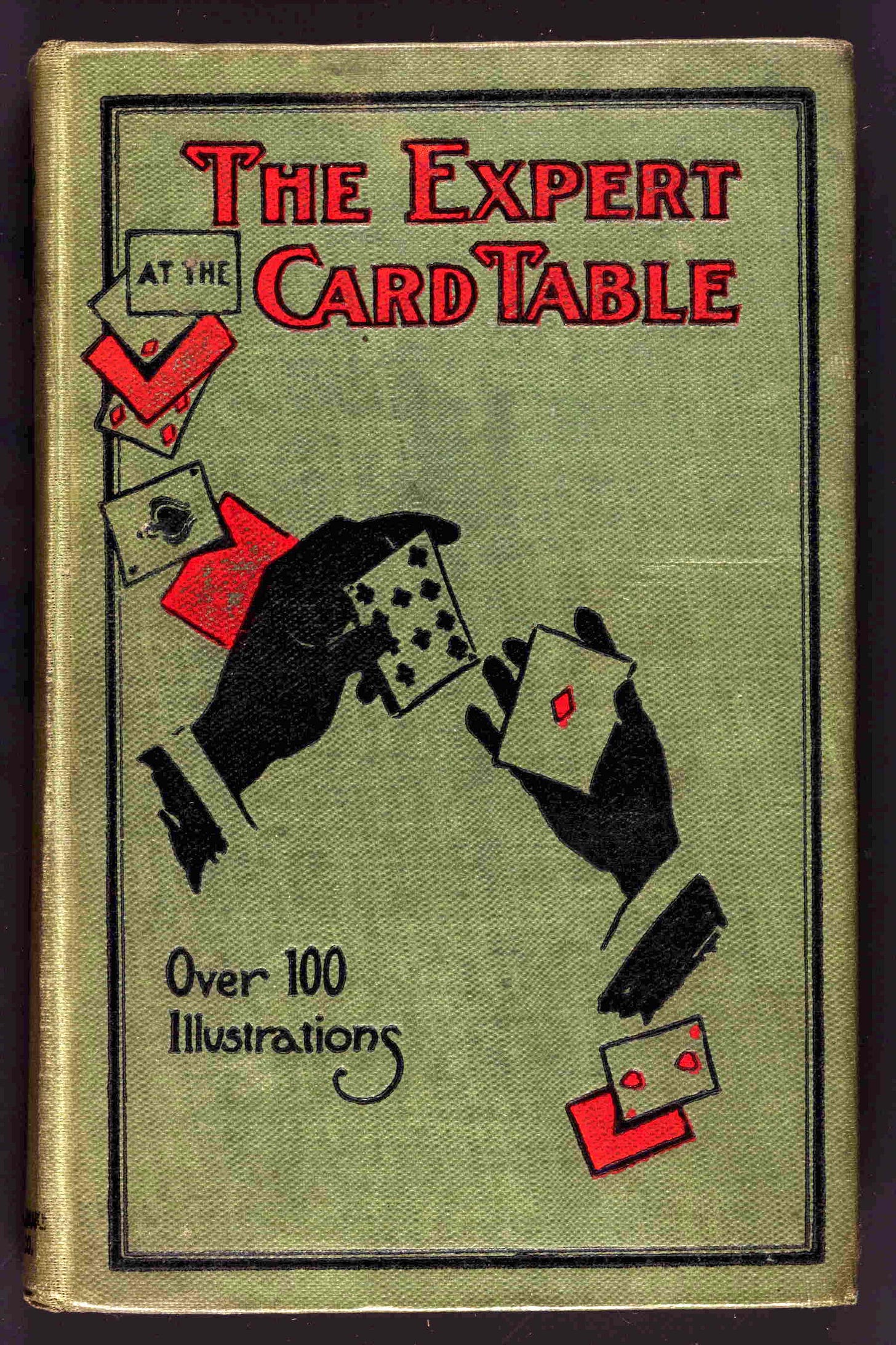Changing the moment
A lesson from 1902.
Sometimes even magicians are fooled.
A case in point is a question that has plagued magicians and literary scholars for more than a century: Who wrote what is considered the Holy Bible of card magic, a book published in 1902 with the lengthy title, Artifice, Ruse and Subterfuge at the Card Table: A Treatise on the Science and Art of Manipulation of Cards?
The author of this book, which taught sleight of hand but mainly exposed the cheating methods of gamblers, used a pseudonym, S. W. Erdnase, likely due to the dangers of exposing secrets of the underworld. By 1905 the book had been retitled The Expert at the Card Table. But it has simply become known to magicians and scholars as “Erdnase.”
Whoever Erdnase really was, he pulled off probably the greatest magic trick of all time: He disappeared without a trace, and to this day, despite dozens of books and hundreds of articles seeking his identity, the true identity of S.W. Erdnase remains shrouded in mystery. One theory has it that S.W. Erdnase is simply E.S. Andrews spelled backward, but this is widely disputed, and to this day, no one knows for sure who wrote what is considered the most important book on card gambling and sleight of hand ever written.
It would be good to know, because the book was artfully written and contains sage advice that has stood the test of time, including the most famous and oft-quoted passage in Erdnase:
“The resourceful professional failing to improve the method changes the moment.”—S.W. Erdnase, The Expert at the Card Table
Now, not to tell tales out of school (especially when that school is Hogwarts), but this single thought is at the very heart of getting away with some very tricky stuff, especially when it’s late at night, everyone at the card table is on edge and there is $500 in the kitty. Erdnase was referring to how the most polished professional gamblers cheat when they’re being watched—how they slip three aces to their secret accomplice in a high-stakes game of poker while everyone is staring at the gambler’s hands, or how to ring in a “cooler”—a deck of cards stacked in a certain order that is secretly switched for the deck in use, a deck that is cold to the touch because it hasn’t been handled.
Erdnase meant that if everyone is staring at you, cause a distraction, act casual, glance away from your guilty hands, wait a few beats and above all, relax. Sure enough, everyone at the table will relax, too, and when they do, that’s when you make your move. When you can’t improve the method, change the moment.
It’s good advice. But what does a book written in 1902 about gambling subterfuge have to do with the here and now? This week brought another school shooting in America, this time in Nashville. Despite the horrible frequency of gun-related violence in our country, how does one even begin to process this? What is the constant shock, grief and outrage doing to our health, both mental and physical? How do we change what is happening? Is a lesson divulged more than a century ago really of any use?
After all, life is a bit more complicated now than it was back when Teddy Roosevelt was president, although Erdnase was published in the middle of the first epidemic in the United States, the bubonic plague in San Francisco, an epidemic that put politicians at war with each other. (Some things haven’t changed.) Doesn’t it sometimes seem that today’s crises are amplified versions of all the crises that have gone before? Our wars are longer, our politics more divided, gun violence more frequent, and all kinds of subterfuge, from tax evasion to international internet bots to systemic forms of oppression, more devious and deeply wired.
Our times, it seems, call for drastic measures, the proverbial thinking outside the box. Perhaps it’s not about thinking outside the box, however, but more deeply within, where all the action is. It might just be worthwhile to reach further down into our own bag of tricks, our coping mechanisms, our spiritual methods or practices, to give ourselves better odds at winning at this grand game of chance we’ve all been born into and wake up to every day.
So here’s one bit of subterfuge that might be worth trying: to paraphrase Erdnase and say, “The fully alive practitioner of life, failing to improve the madness, changes the moment.”
How? Try flipping things a bit. Consider that despite the daily headlines and overwhelming evidence of bad things happening to good people, goodness is everywhere. In fact, there is so much more goodness than badness if one would only take a moment to ponder.
The bad stuff—the violence, the dividedness, the subterfuge—commands our attention precisely because it is so foreign to our essence. When we are waylaid by news headlines first thing every morning, remember why that stuff is news: it’s not the usual. It’s not who we are. It’s not what most of the world is. The real alternative facts against those newsprint facts are these: There is far more love in the world than hate. Most people have loving hearts. And love never has to innovate. Love just is. Hate and derision have to innovate because they keep failing at higher and higher levels.
Our war machines and all manner of spy-versus-spy keep growing more sophisticated because they can’t hold a candle to love. As Ralph Waldo Emerson once said, “All evil is so much death or nonentity. Benevolence is absolute and real.” That’s what we have going for us. It is because benevolence or goodness is so omnipresent that we tend to forget. It is when we remember this that we change the moment.
Because sometimes, especially if the stakes are high, as they so often are these days, it helps to think like a gambler, and when you can’t change the madness, change the moment. Relax. Take a deep breath. Think of the most beautiful, calming place you’ve ever been. Listen more than speak. Gaze at a spot beyond the horizon and remind yourself that we are teeny tiny people on a teeny tiny planet in the expanding universe. Quietly chant your personal mantra, and if you don’t have a mantra, get one at your earliest convenience. You can carry your mantra wherever you go; it doesn’t weigh anything.
Going almost all the way back to my beginnings as a conjuror, when I first learned how to find someone’s chosen card—awkwardly—I’ve discovered a lot of parallels between being a good magician and living a good life. As I grew, I came to see everyone as having their own special magic. I believe everyone does something that is so them that only they know the secrets to how they do it.
Believe it or not, me just being who I am and you just being who you are can be enough to change a moment. It is together that we win the high-stakes game of chance we play every day, and as long as we know that, and act upon it, the madness doesn’t stand a chance and won’t misdirect us for a minute.
That isn’t to say what happened this week in Nashville wasn’t real. It was all too real, the loss of life and lives raising more emotions than heaven can hold. The aftermath, including the predictable national conversation that seems to go nowhere, will be all too real as well. What is important to remember is that this is not all we are. It is part of us, it is part of our lives, to be sure. But we are also so much more.
To live in this world is to be a bit of a gambler. We can’t change the past—the hands that have been dealt—and although we can strive to change the future, there are many players at the table of life, some with cheating on their minds. Let’s just remember that between what was and what will be, the present is made up of moments. And moments we can change. In those moments, try betting on love, your ace in the hole. You may find, with gladness, that the odds are overwhelmingly in your favor.




